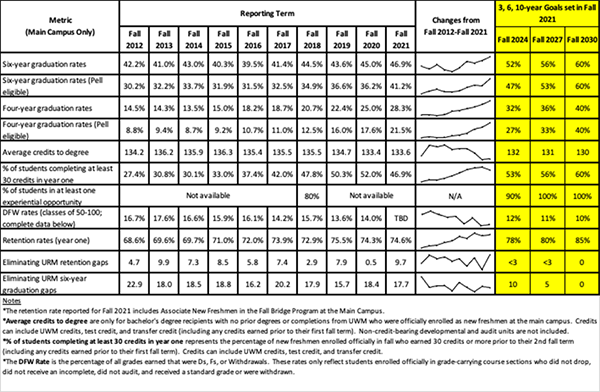Provost’s Office Strategic Update: Student-Centric Efforts
Welcome to the third Provost’s Office Strategic Update, the second of the 21-22 academic year. You can read previous Strategic Updates here. We hope through these Strategic Updates to provide clarity on our goals and the wide range of initiatives that are underway.
For this update we’re focusing on “student-centric” efforts. The 2030 Implementation Team Final Report emphasized UWM’s need to focus efforts on becoming a student-centric university. Given the specific changes recommended by the 2030 report and the many efforts already under way, one important step is creating a coherent framework that consolidates and coordinates our student-centric work, clarifying administrative oversight and accountability.
I appreciate your taking the time to read this update, and we welcome your questions and input as we continue this important work.
Take care,
Johannes
A Data-Driven Approach
As discussed in our May 2021 update, part of our renewed emphasis on student success was identifying key metrics by which we will judge progress; some of these metrics are national standards (first-year retention, four- and six-year graduation rates) and some are more specific to our institution (experiential learning participation). Please see Table 1 below, which includes our metrics for fall 2021.Table 1 shows that we have much to be proud of, in that our students continued to make good progress despite the ongoing challenges of the pandemic. That progress is a real tribute to the hard work of our faculty and staff. There are also some areas for concern, in that we are continuing to see success gaps for underrepresented minority (URM) students, and as a result, the Office of Assessment and Institutional Research (OAIR) is working to disaggregate the data so that we can do a deeper analysis.
Table 1: click table to enlarge

To continue improving on student success, we have launched a number of initiatives (e.g., Moon Shot for Equity and MCubed) and internal strategic plans (e.g., 2030, DEI Framework). To ensure progress and accountability, we are bringing all of these efforts into a coordinated model, organized by the 2030 work, that will allow us to combine efforts across units, to clearly define administrative sponsors and project leads, and to identify a strategic framework that expresses UWM’s commitment to becoming a student-centric campus.
A Framework
UWM’s current and planned student success initiatives can be usefully summarized using three statements about UWM’s commitments:
- Commitment to an Inclusive and Supportive Panther Community
- Commitment to Students’ Academic Journey
- Commitment to Students’ Personal Growth & Financial Security
Each of these commitments is associated with several strategies, each of which is further broken down into specific, measurable steps. For example, “Create a campus-wide, comprehensive scholarship, grant, and financial aid strategy” (a recommendation coming out of 2030, Moon Shot, and MCubed) has the following steps:
- Create a need-based funding team that will coordinate efforts for a robust funding campaign
- Enhance the effectiveness of the scholarship portal
- Ensure all funds from the Wisconsin Tuition Grant are awarded annually
- Optimize emergency grant fund operations
- Offer retention grants for in-need students; Institutionalize the retention grant to support the continuous enrollment of students who do not reenroll due to outstanding balances at UWM
- Increase FAFSA (financial aid) completion, financial aid, and scholarships so more students can access college; Promote FAFSA completion and financial wellness
You can view the complete set of strategies and steps on the student-centric web page. Here is a summary of the key strategies:
Commitment to an Inclusive and Supportive Panther Community
- Create more equitable and inclusive practices that reflect our commitment to anti-racism, justice, and inclusion (Leads: Kelly Haag and Chia Vang)
- Create a student-centric experience with coordinated messaging (Lead: Kelly Haag)
- Equip Faculty/Staff/Leaders to cultivate and sustain a Student Centric Campus (Lead: Dave Clark)
- Enhance and build collaborative prospective student support networks with family and community (Leads: Dave Clark and Phyllis King)
Commitment to Students’ Academic Journey
- Establish a network of support and ensure equitable access to high-quality student services (Leads: Dave Clark and Kelly Haag)
- Eliminate institutional barriers to student success (Lead: Kay Eilers)
- Create undergraduate academic degree maps that chart a path from matriculation to graduation and career, integrate a revised GE program, and seamlessly integrate with transfer pathways (Leads: Dave Clark and Phyllis King)
- Improve access for MPS first generation and diverse populations to attract and retain high achieving students from surrounding region (Lead: Dave Clark)
- Create innovative credentialling pathways partnering with business and industry (Leads: Phyllis King and Laura Pedrick)
- Develop Pathways and Supports for Adult Learners (Lead: Dave Clark)
- Develop a coordinated series of transfer pathways between UWM and other state institutions (Leads: Dave Clark and Phyllis King)
Commitment to Students’ Personal Growth & Financial Security
- Create a campus-wide, comprehensive scholarship, grant and financial aid strategy (Lead: Kay Eilers)
- Advance a comprehensive Student Experiential Learning Framework (Lead: Kay Eilers)
For each strategy and action, we have identified project sponsors who are accountable for the success of that strategy and/or project. Some of the projects are underway and have early successes. Other projects are identified to start later this academic year. Currently, sponsors are working with the various project leaders to identify project status, metrics, and needs for moving forward.
The team working on this framework attempted to address many of the concerns expressed in the 2030 Implementation Report. Similarly, the team attempted to build a framework that would allow for additional strategies and projects to be added as necessary. In short, the work to advance UWM’s student-centric efforts is dynamic and actively moving forward to make UWM a radically welcoming campus.
